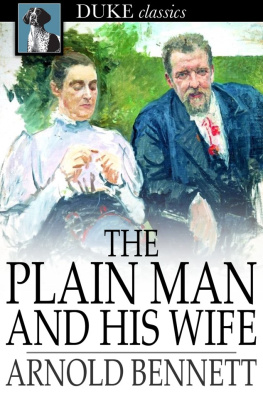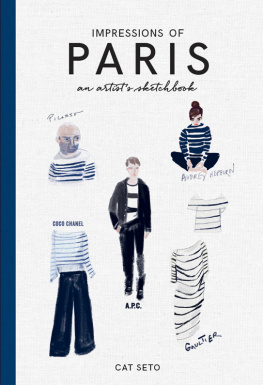IARTISTIC EVENING
T he first invitation I ever received into a purely Parisian interior might have been copied out of a novel by Paul Bourget. Its lure was thus phrased: Un peu de musique et dagrables femmes. It answered to my inward vision of Paris. My experiences in London, which fifteen years earlier I had entered with my mouth open as I might have entered some city of Oriental romance, had, of course, done little to destroy my illusions about Paris, for the ingenuousness of the artist is happily indestructible. Hence, my inward vision of Paris was romantic, based on the belief that Paris was essentially different. Nothing more banal in London than a little music, or even some agreeable women! But what a difference between a little music and un peu de musique! What an exciting difference between agreeable women and agrables femmes! After all, this difference remains nearly intact to this day. Nobody who has not lived intimately in and with Paris can appreciate the unique savour of that word femmes. Women is a fine word, a word which, breathed in a certain tone, will make all meneven bishops, misogynists, and political propagandistsfall to dreaming! But femmes is yet more potent. There cling to it the associations of a thousand years of dalliance in a land where dalliance is passionately understood.
The usual Paris flat, high up, like the top drawer of a chest of drawers! No passages, but multitudinous doors. In order to arrive at any given room it is necessary to pass through all the others. I passed through the dining-room, where a servant with a marked geometrical gift had arranged a number of very small plates round the rim of a vast circular table. In the drawing-room my host was seated at a grand piano with a couple of candles in front of him and a couple of women behind him. See the light glinting on bits of the ebon piano, and on his face, and on their chins and jewels, and on the corner of a distant picture frame; and all the rest of the room obscure! He wore a jacket, negligently; the interest of his attire was dramatically centred in his large, limp necktie; necktie such as none hut a hero could unfurl in London. A man with a very intelligent face, eager, melancholy (with a sadness acquired in the Divorce Court), wistful, appealing. An idealist! He called himself a publicist. One of the women, a musical composer, had a black skirt and a white blouse; she was ugly but provocative. The other, all in white, was pretty and sprightly, but her charm lacked the perverseness which is expected and usually found in Paris; she painted, she versified, she recited. With the eye of a man who had sat for years in the editorial chair of a ladies paper, I looked instinctively at the hang of the skirts. It was not good. Those vague frocks were such as had previously been something else, and would soon he transformed by discreet modifications into something still else. Candlelight was best for them. But what grace of demeanour, what naturalness, what candid ease and appositeness of greeting, what absence of self-consciousness! Paris is the self-unconscious.
I was presented as le romancier anglais. It sounded romantic. I thought: What a false impression they are getting, as of some vocation exotic and delightful! If only they knew the prose of it! I thought of their conception of England, a mysterious isle. When Balzac desired to make a woman exquisitely strange, he caused her to be born in Lancashire.
My host begged permission to go on playing. In the intervals of being a publicist, he composed music, and he was now deciphering a manuscript freshly written. I bent over between the two women, and read the title:
Ygdrasil: reverie.
When there were a dozen or fifteen people in the room, and as many candles irregularly disposed like lighthouses over a complex archipelago, I formed one of, a group consisting of those two women and another, a young dramatist who concealed his expressive hands in a pair of bright yellow gloves, and a middle-aged man whose constitution was obviously ruined. This last was librarian of some public libraryI forget whichand was stated to be monstrously erudite in all literatures. I asked him whether he had of late encountered anything new and good in English.
I have read nothing later than Swinburne, he replied in a thin, pinched voicelike his features, like his wary and suffering eyes. Speaking with an icy, glittering pessimism, he quoted Stendhal to the effect that a man does not change after twenty-five. He supported the theory bitterly and joyously, and seemed to taste the notion of his own intellectual rigidity, of his perfect inability to receive new ideas and sensations, as one tastes an olive. The young dramatist, in a beautifully curved phrase, began to argue that certain emotional and purely intellectual experiences did not come under the axiom, but the librarian would have none of such a reservation. Then the women joined in, and it was just as if they had all five learnt off by heart one of Landors lighter imaginary conversations, and were performing it. Well convinced that they were all five absurdly wrong, fanciful, and sentimental either in optimism or pessimism, I nevertheless stood silent and barbaric. Could I cut across that lacework of shapely elegant sentences and apposite gestures with the jagged edge of what in England passes for a remark? The librarian was serious in his eternal frost. The dramatist had the air of being genuinely concerned about the matter; he spoke with deference to the librarian, with chivalrous respect to the women, and to me with glances of appeal for help; possibly the reason was that he was himself approaching the dreadful limit of twenty-five. But the womens eyes were always contradicting the polite seriousness of their tones. Their eyes seemed to be always mysteriously talking about something else; to be always saying: All this that you are discussing is trivial, but I am brooding for ever on what alone is important. This, while true of nearly all women, is disturbingly true of Parisians. The ageing librarian, by dint of freezing harder, won the altercation: it was as though he stabbed them one by one with a dagger of ice. And presently he was lecturing them. The women were now admiring him. There was something in his face worn by maladies, in his frail physical unpleasantness, and in his frigid and total disgust with life, that responded to their secret dream. Their gaze caressed him, and he felt it falling on him like snow. That he intensely enjoyed his existence was certain.
They began talking low among themselves, the women, and there was an outburst of laughter; pretty giggling laughter. The two who had been at the piano stood aside and whispered and laughed with a more intimate intimacy, struggling to suppress the laughter, and yet every now and then letting it escape from sheer naughtiness. They cried. It was the fou rire. Impossible to believe that a moment before they had been performing in one of Landors imaginary conversations, and that they were passionately serious about art and life and so on. They might have been schoolgirls.






